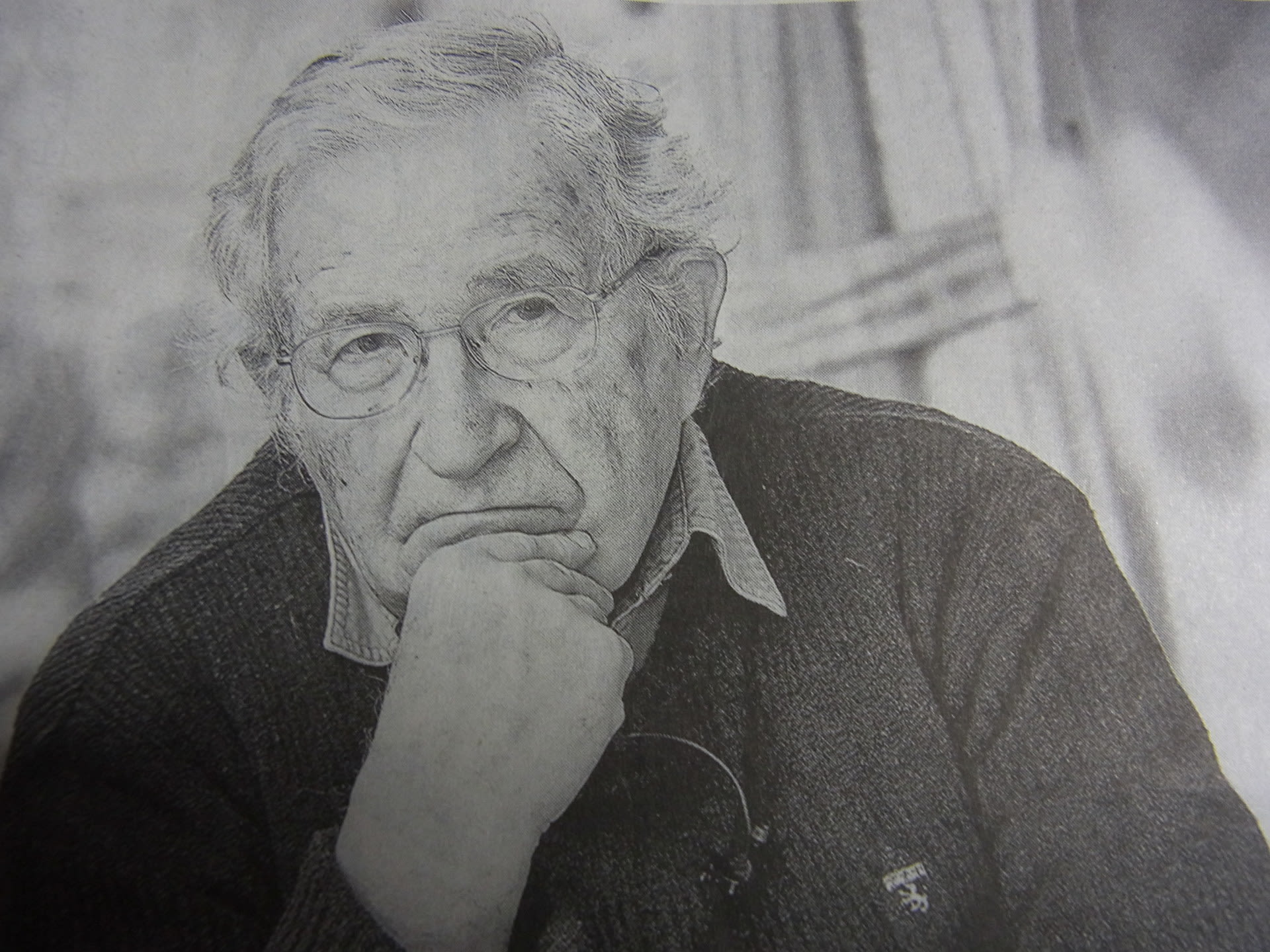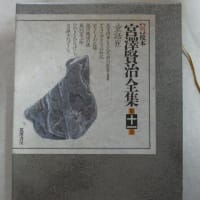

『2014年3月8日 東京新聞 こちら特報部』
※ 詳細は、徐々に追記していきます。
(※この記事の最初の投稿日は、2014.3.10です。)
【2015.11.11 追記】
推敲の余地が大いにあることは承知しているのだが、一応最後まで翻訳が終わった。
これでようやく、心置きなく、「日光植物園」へ行くことができる。
^Ⅲ^)
チョムスキー教授、12月7日のお誕生日おめでとうございます!
【2015.3.13 追記】 まだ翻訳が終わっていないが、チョムスキー教授の今度の誕生日までには必ず完成させると固く決意をして、一旦もとの場所へ戻す。
^Ⅲ^)
【2014年12月7日(米国時間) 追記】
HAPPY BIRTHDAY, Professor Noam Chomsky!
これは2年前の記事ですが、まだ翻訳が終わっていなくてすみません(笑)。
【2014年12月7日(米国時間)追記、ここまで】
【2014. 3.12 追記】 【改訂版 2014.10.13~】
一昨年の12月、映画監督のマイケル・ムーア氏が、チョムスキー教授の「言語学」についての記事を、ツイッターで紹介して下さっています。
『The New Yorker』(2012.12.7)GARY MARCUS
http://www.newyorker.com/online/blogs/newsdesk/2012/12/the-legacy-of-noam-chomsky.html
The New Yorker
DECEMBER 7, 2012
HAPPY BIRTHDAY, NOAM CHOMSKY
POSTED BY GARY MARCUS
Noam Chomsky turns eighty-four today, more than a half century after he exploded onto the scene of linguistics, in in the late nineteen-fifties, as a young professor at M.I.T.
ノーム・チョムスキーは今日84歳になり、1950年代後期にM.I.T.(マサチューセッツ工科大学)の若き教授として、言語学の舞台の上でその誤りを暴いてから、半世紀以上である。
His career began perhaps most notably with a book review that helped launch an entire field of linguistics (known as generative grammar) and laid waste to another (the behaviorist view of B. F. Skinner that then dominated psychology).
彼の経歴は、ことに依ると最も注目に値するのが、言語学の全分野(生成文法として知られる)を出発することを促進した、荒廃がおおった別のもの(B.K.スキナーの行動主義者の見方が当時支配した心理学)の書評と共に始まった。
From that moment forward, linguistics truly has never been the same.
その瞬間から将来に向かって、言語学は真実に、決して同じではなくなってきている。
He remains as influential, and divisive, as he was when Larissa MacFarquhar wrote a Profile of Chomsky in The New Yorker nearly a decade ago (“The Devil’s Accountant”).
彼はあいかわらず影響力を持ち対立を生む人物のままであり、ラリッサ・マクファーカーが10年近く前にニューヨーカーに書いたチョムスキーの紹介(悪魔の会計士)の彼がそうだった。
He has at least three new essays on linguistics coming out soon, and if time has slowed him down, it’s not by very much.
彼はいずれにせよ、もうすぐ言語学の3篇の小論を世に出し、たとえ時に彼が緩慢にされても、それほどでもない。
A few months ago, I sent him a manuscript and he replied, with comments, in less than half an hour.
数ヶ月前、私は彼に原稿を送り、30分弱のコメントと共に返信された。
I can’t speak to his politics, for which he is equally well known.
私は言語学と同じくらいよく知られた、彼の政治学を話すことはできない。
But since his earliest days, Chomsky’s scientific concerns have been as much about philosophy as linguistics.
しかし彼の最も初期の時から、チョムスキーの科学的な関心は、哲学についてと同様の言語学である。
For most of us, words and sentences are tools for communicating.
多くの私たちにとって、単語と文は意思を疎通するための道具だ。
But for Chomsky, words and sentences are tools for understanding the nature and origins of knowledge.
けれどもチョムスキーにとって、単語と文は自然の本質と知の起源を理解するための道具なのだ。
Chomsky sees himself, correctly, as continuing a conversation that goes back to Plato, especially the Meno dialogue, in which a slave boy is revealed by Socrates to know truths about geometry that he hadn’t realized he knew.
チョムスキーが彼自身を悟るのは、正確に、対話を引き続くように、プラトンの特にメノンの対話篇へ戻ることで、それは奴隷の少年がソクラテスによって明らかにさせられる、幾何学についての真実を知ることは、彼が(説明を聞いて)理解したのではなく知っていたのだということを。
Plato’s question was whether any of what we know about the world is innate as opposed to acquired through experience.
プラトンの問いは、私たちが知る世界についてのどんなものでも、生得で、同様に、経験を通して取得したというのには対立したのかどうか、ということだった。
For Chomsky, the interest in linguistics isn’t so much whether one language uses infinitives and another uses subjunctives but whether all languages are, at some level, deeply related and constrained by what Chomsky dubbed “universal grammar.”
チョムスキーにとって、言語学の関心は、ひとつ言語が使う不定詞と、もうひとつが使う仮定法ですらなく、全ての言語がそうであるかどうかで、いくらかの水準で、チョムスキーが名付けた「普遍文法」によって、深く関連づけ、束縛した。
※ universal grammar 〔言語学〕 普遍文法 《1) 言語の普遍的な特徴・制約を確立しようと試みる文法 2) 人間の言語能力の根底にある生得的体系》.
『リーダーズ英和辞典第3版』
【追記 2014.3.14】
『メノン』プラトン(藤沢令夫 訳) から
メノン 「わかりました、ソクラテス。ただしかし、われわれは学ぶのではなく、「学ぶ」とわれわれが呼んでいることは、想起にほかならないのだと言われるのは、どのような意味なのでしょうか。ほんとうにそのとおりだということを、私に教えることができますか。」
Meno. Yes,Socrates;but what do you mean by saying that we do not learn,and that what we call learning is only a process of recollection?Can you teach me how this is? ――『Meno』Plato (Translated by Benjamin Jowett)〔Library of Liberal Arts〕
ソクラテス 「だからさっきもぼくは言ったのだよ、メノン、君は油断のならない男だとね。いまも君は、ぼくが君に教えることができるかどうかなどとたずねてくる――教えるのではなく想起するのだと、ぼくが主張しているのに。つまり、ぼくが自分の言葉と矛盾したことを言うのを、たちどころに暴露させようというつもりなのだね。」
Socrates. I told you,Meno,just now that you were a rogue,and now you ask whether I can teach you,when I am saying that there is no teaching,but only recollection;and thus you imagine that you will involve me in a contradiction.
メノン 「いえいえ、ゼウスに誓って、ソクラテス、けっしてそんなつもりで言ったのではありません。つい、くせが出たのです。でも、あなたの説を証明できる方法が何かあるなら、証明してみせてくださいませんか。」
Meno. Indeed,Socrates,I protest that I had no such intention.I only asked the question from habit;but if you can prove to me that what you say is true,I wish that you would.
ソクラテス 「なかなかむずかしい注文だが、まあ君のためなら、努力してやってみよう。――では、そこにいるたくさんの君の従者のなかから、これはと思うのを誰かひとり、ぼくのためにここへ呼び出してくれたまえ。その者をつかって君に証明するから。」
Socrates. It will be no easy matter,but I will try to please you to the utmost of my power.Suppose that you call one of your numerous attendants,that I may demonstrate on him.
メノン 「承知しました。(召使の一人に)君、ここへ来たまえ。」
Meno. Certainly.Come hither,boy.
ソクラテス 「ギリシア人だね?ギリシア語を話すだろうね?」
Socrates. He is Greek,and speaks Greek,dose he not?
メノン 「ええ、それはもう……。私の家で生まれたのですから。」
Meno. Yes,indeed;he was born in the house.
ソクラテス 「さあそれでは、よく注意していてくれたまえ。この子が想起するとわかるか、それともぼくから教えられるのか、という点にね。」
Socrates. Attend now to the questions which I ask him,and observe whether he learns of me or only remembers.
メノン 「よく注意していましょう。」
Meno. I will.
【追記 2014.3.14 (英文部分 2014.3.31)】 ここまで
【2015.8.5 追記】
※ ここでソクラテスは、「学ぶ(教える)」ではなく「想起する」であることを証明するために、少年に簡単な幾何の問題を示す。
このプラトンの『メノン』はウェブ上にあったので、続きの部分を写しておく。 Beniamin Jowett 訳 。

『メノン』藤沢令夫 訳
Soc. Tell me, boy, do you know that a figure like this is a square? (ABCD)
Boy. I do.
Soc. And you know that a square figure has these four lines equal?
Boy. Certainly.
Soc. And these lines which I have drawn through the middle of the
square are also equal? (EG・FH)
Boy. Yes.
Soc. A square may be of any size?
Boy. Certainly.
Soc. And if one side of the figure(AB) be of two feet, and the other side(BC)
be of two feet, how much will the whole be? Let me explain: if in
one direction the space(AB) was of two feet, and in other direction(AD) of
one foot, the whole would be of two feet taken once?
Boy. Yes.
Soc. But since this side(AD)is also of two feet, there are twice two
feet?
Boy. There are.
Soc. Then the square is of twice two feet?
Boy. Yes.
Soc. And how many are twice two feet? count and tell me.
Boy. Four, Socrates.
Soc. And might there not be another square twice as large as this,
and having like this the lines equal?
Boy. Yes.
Soc. And of how many feet will that be?
Boy. Of eight feet.
Soc. And now try and tell me the length of the line which forms the
side of that double square: this(ABCD) is two feet-what will that be?
Boy. Clearly, Socrates, it will be double.
Soc. Do you observe, Meno, that I am not teaching the boy anything,
but only asking him questions; and now he fancies that he knows how
long a line is necessary in order to produce a figure of eight square
feet; does he not?
Men. Yes.
Soc. And does he really know?
Men. Certainly not.
Soc.He only guesses that because the square is double, the line is
double.
Men. True.
Soc. Observe him while he recalls the steps in regular order.
(To the Boy.) Tell me, boy, do you assert that a double space comes from
a double line? Remember that I am not speaking of an oblong, but of
a figure equal every way(ABCD), and twice the size of this-that is to say
of eight feet; and I want to know whether you still say that a double
square comes from double line?
Boy. Yes.

『メノン』藤沢令夫 訳
Soc. But does not this line become doubled(AK) if we add another such
line(BK) here?
Boy. Certainly.
Soc. And four such lines(AK) will make a space containing eight feet?
Boy. Yes.
Soc. Let us describe such a figure: Would you not say that this is
the figure(AKLM)of eight feet?
Boy. Yes.
Soc. And are there not these four divisions(ABCD) in the figure(AKLM), each of which is equal to the figure of four feet?
Boy. True.
Soc. And is not that(AKLM) four times(ABCD) four?
Boy. Certainly.
Soc. And four times is not double?
Boy. No, indeed.
Soc. But how much?
Boy. Four times as much.
Soc. Therefore the double line, boy, has given a space, not twice,
but four times as much.
Boy. True.
Soc. Four times four are sixteen-are they not?
Boy. Yes.
Soc. What line would give you a space of eight(Web版を校正) feet, as this gives
one of sixteen feet;-do you see?
Boy. Yes.
Soc. And the space of four feet(ABCD) is made from this half line(AB)?
Boy. Yes.
Soc. Good; and is not a space of eight feet twice the size of this(ABCD),
and half the size of the other(AKLM)?
Boy. Certainly.
Soc. Such a space, then, will be made out of a line greater than this(AB)
one, and less than that one(AK)?
Boy. Yes; I think so.
Soc. Very good; I like to hear you say what you think. And now tell
me, is not this a line (AB)of two feet and that(AK) of four?
Boy. Yes.
Soc. Then the line which forms the side of eight feet ought to be
more than this line(AB) of two feet, and less than the other(AK) of four feet?
Boy. It ought.
Soc. Try and see if you can tell me how much it will be.
Boy. Three feet.
Soc. Then if we add a half to this line(BR) of two, that will be the line
of three. Here are two(AB) and there(BR) is one; and on the other side(AT), here(AD)
are two also and there(DT) is one: and that makes the figure(ARST) of which
you speak?
Boy. Yes.
Soc. But if there are three feet this way(AR) and three feet that way(AT),
the whole space will be three times three feet?
Boy. That is evident.
Soc. And how much are three times three feet?
Boy. Nine.
Soc. And how much is the double of four?
Boy. Eight.
Soc. Then the figure of eight is not made out of a of three?
Boy. No.
Soc. But from what line?-tell me exactly; and if you would rather
not reckon, try and show me the line.
Boy. Indeed, Socrates, I do not know.
Soc. Do you see, Meno, what advances he has made in his power of recollection?
He did not know at first, and he does not know now, what is the side
of a figure of eight feet: but then he thought that he knew, and answered
confidently as if he knew, and had no difficulty; now he has a difficulty,
and neither knows nor fancies that he knows.
Men. True.
Soc. Is he not better off in knowing his ignorance?
Men. I think that he is.
Soc. If we have made him doubt, and given him the "torpedo's shock,"
have we done him any harm?
Men. I think not.
Soc. We have certainly, as would seem, assisted him in some degree
to the discovery of the truth; and now he will wish to remedy his
ignorance, but then he would have been ready to tell all the world
again and again that the double space should have a double side.
Men. True.
Soc. But do you suppose that he would ever have inquired(Web版を校正) into or learned
what he fancied that he knew, though he was really ignorant of it,
until he had fallen into perplexity under the idea that he did not
know, and had desired to know?
Men. I think not, Socrates.
Soc. Then he was the better for the torpedo's touch?
Men. I think so.
Soc. Mark now the further(Web版を校正) development. I shall only ask him, and not
teach him, and he shall share the inquiry with me: and do you watch
and see if you find me telling or explaining anything to him, instead
of eliciting his opinion.
【2015.8.5追記 ここまで】
【2015.8.9追記】

『メノン』藤沢令夫 訳
Soc(続き). Tell me, boy, is not this a square(ABCD) of four
feet which I have drawn?
Boy. Yes.
Soc. And now I add another square(BKPC) equal to the former one?
Boy. Yes.
Soc. And a third, which(CPLQ) is equal to either of them?
Boy. Yes.
Soc. Suppose that we fill up the vacant corner? (DCQM)
Boy. Very good.
Soc. Here, then, there are four equal spaces?
Boy. Yes.
Soc. And how many times larger is this space(ABCD) than this other(AKLM)?
Boy. Four times.
Soc. But it ought to have been twice only, as you will remember.
Boy. True.
Soc. And does not this line(BD その他), reaching from corner to corner, bisect
each of these spaces?
Boy. Yes.
Soc. And are there not here four equal lines(DB・BP・PQ・QD) which contain this space(DBPQ)?
Boy. There are.
Soc. Look and see how much this space(DBPQ) is.
Boy. I do not understand.
Soc. Has not each interior line(DB・BP・PQ・QD) cut off half of the four spaces?
Boy. Yes.
Soc. And how many spaces are there in this section(DBPQ)?
Boy. Four.
Soc. And how many in this(ABCD)?
Boy. Two.
Soc. And four is how many times two?
Boy. Twice.
Soc. And this space(DBPQ) is of how many feet?
Boy. Of eight feet.
Soc. And from what line do you get this figure?
Boy. From this(DB その他).
Soc. That is, from the line which extends from corner to corner of
the figure of four feet?
Boy. Yes.
Soc. And that is the line which the learned call the diagonal. And
if this is the proper name, then you, Meno's slave, are prepared to
affirm that the double space is the square of the diagonal?
Boy. Certainly, Socrates.
Soc. What do you say of him, Meno? Were not all these answers given
out of his own head?
Men. Yes, they were all his own.
Soc. And yet, as we were just now saying, he did not know?
Men. True.
Soc. But still he had in him those notions of his-had he not?
Men. Yes.
Soc. Then he who does not know may still have true notions of that
which he does not know?
Men. He has.
Soc. And at present these notions have just been stirred up in him,
as in a dream; but if he were frequently asked the same questions,
in different forms, he would know as well as any one at last?
Men. I dare say.
Soc. Without any one teaching him he will recover his knowledge for
himself, if he is only asked questions?
Men. Yes.
Soc. And this spontaneous recovery of knowledge in him is recollection?
Men. True.
Soc. And this knowledge which he now has must he not either have acquired
or always possessed?
Men. Yes.
Soc. But if he always possessed this knowledge he would always have
known; or if he has acquired the knowledge he could not have acquired
it in this life, unless he has been taught geometry; for he may be
made to do the same with all geometry and every other branch of knowledge.
Now, has any one ever taught him all this? You must know about him,
if, as you say, he was born and bred in your house.
※ このソクラテスの発言の青字の部分は少し飛躍のような気もするが、発言の全体は教育の本質である。
Men. And I am certain that no one ever did teach him.
Soc. And yet he has the knowledge?
Men. The fact, Socrates, is undeniable.
Soc. But if he did not acquire the knowledge in this life, then he
must have had and learned it at some other time?
※ ここから魂の不死の問題へ入る。
Men. Clearly he must.
Soc. Which must have been the time when he was not a man?
Men. Yes.
Soc. And if there have been always true thoughts in him, both at the
time when he was and was not a man, which only need to be awakened
into knowledge by putting questions to him, his soul must have always
possessed this knowledge, for he always either was or was not a man?
Men. Obviously.
Soc. And if the truth of all things always existed in the soul, then
the soul is immortal. Wherefore be of good cheer, and try to recollect
what you do not know, or rather what you do not remember.
Men. I feel, somehow, that I like what you are saying.
Soc. And I, Meno, like what I am saying. Some things I have said of
which I am not altogether confident. But that we shall be better and
braver and less helpless if we think that we ought to enquire, than
we should have been if we indulged in the idle fancy that there was
no knowing and no use in seeking to know what we do not know;-that
is a theme upon which I am ready to fight, in word and deed, to the
utmost of my power.
Men. There again, Socrates, your words seem to me excellent.
Soc. Then, as we are agreed that a man should enquire about that which
he does not know, shall you and I make an effort to enquire together
into the nature of virtue?
Men. By all means, Socrates. And yet I would much rather return to
my original question,……
【2015.8.9 追記 ここまで】
That idea of universal grammar didn’t just change linguistics, it had repercussions for virtually every field that concerns the mind.
その普遍文法の考え方は まさに言語学を変えたのではなく、実質的に心に関係する全ての分野に反響していった。
In developmental psychology, for example, no idea has ever been as controversial, or as pivotal.
発達心理学に例をとると、これまで論議の的となる、もしくは中心的な考え方がなかった。
How much do children know about language before they even begin to talk?
どの程度の子供たちが、話し始める前でさえ、言葉について知るのか。
Do they learn language simply by imitating their parents, or is there a built-in language-acquisition device (or what Steven Pinker called a “language instinct”)?
子供たちは言葉を単に彼らの両親のまねをすることによって身につけるのか、もしくは、生まれつき組み込まれた、言語習得装置(もしくはスティーブン・ピンカーが「言語本能」と呼んだ)があるのだろうか。
Parallel questions soon arose in other aspects of cognitive development as well.
平行した問いは、すぐ容易に、もうひとつの認識発達の解釈が発生した。
Part of Chomsky’s argument begins with the observation that language is infinite, with no end to the number of possible sentences that you can produce and comprehend.
チョムスキーの主張の重要部分は、言語は無限で、あなたが作り出し理解することができる、ありうる文の数に終わりはないという、観察とともに始めた。
Take Chomsky’s sole entry in Bartlett’s Quotations, “colorless green ideas sleep furiously”; even if you don’t know what it means, you can still immediately apprehend that the sentence is grammatical, whereas “green furiously ideas colorless sleep” is not.
バートレットの引用のなかに、チョムスキーの入口をひとつだけとると、「色のない緑の観念が猛然と眠る」、たとえあなたがこの文の意味をわからないとしても、あなたはそれにもかかわらず、この文は文法的に正しいと、すぐに理解することができるのに対して、「緑猛然と観念色のない眠る」、はそうではない。
【2015.8.26 追記】
“colorless green ideas sleep furiously” と “green furiously ideas colorless sleep”の文は、この『統辞構造論』のp.15 に載っていました。

【2015.8.26 追記 ここまで】
Yet any given child’s experience is finite; we constantly encounter sentences that we have never heard or seen before.
それまで少しは与えられた子供の経験は有限であり、私たちは常にいまだかつて聞いたり見たりしたことのない文に出会う。
For Chomsky, the question of linguistics is how children bridge the gap between finite and infinite, from the finite input that they have heard to the infinity of what they can comprehend.
チョムスキーにとっての言語学の問いは、どうやって子供たちが有限と無限の間のとぎれを乗り越えるのかであり、有限の入力から彼らが聞いた無限を、いかほど彼らが完全に理解できるのか、ということだ。
In framing the problem in this way, Chomsky took an ancient and seemingly imponderable question―about nature versus nurture ―and turned it into something that is actually testable.
この問題の構成の道筋のなかに、チョムスキーは、古来のもっともらしい評価ができない問いを取り、 ―自然かそれとも養育や教育かについて― それは実は検査,分析できる何かであることへとひっくり返した。
(字数制限を超えたので、次ページへ続く)
























